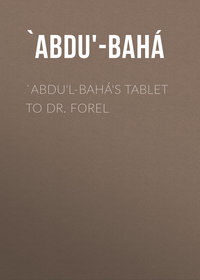Kitabı oku: «`Abdu'l-Bahá's Tablet to Dr. Forel», sayfa 2
Consider: according to the law of nature man liveth, moveth and hath his being on earth, yet his soul and mind interfere with the laws thereof, and
[Pages 11–20]
even as the bird he flieth in the air, saileth speedily upon the seas and as the fish soundeth the deep and discovereth the things therein. Verily this is a grievous defeat inflicted upon the laws of nature.
So is the power of electrical energy: this unruly violent force that cleaveth mountains is yet imprisoned by man within a globe! This is manifestly interfering with the laws of nature. Likewise man discovereth those hidden secrets of nature that in conformity with the laws thereof must remain concealed, and transfereth them from the invisible plane to the visible. This, too, is interfering with the law of nature. In the same manner he discovereth the inherent properties of things that are the secrets of nature. Also he bringeth to light the past events that have been lost to memory, and foreseeth by his power of induction future happenings that are as yet unknown. Furthermore, communication and discovery are limited by the laws of nature to short distances, whereas man, through that inner power of his that discovereth the reality of all things, connecteth the East with the West. This, too, is interfering with the laws of nature. Similarly, according to the law of nature all shadows are fleeting, whereas man fixeth them upon the plate, and this, too, is interference with a law of nature. Ponder and reflect: all sciences, arts, crafts, inventions and discoveries, have been once the secrets of nature and in conformity with the laws thereof must remain hidden; yet man through his discovering power interfereth with the laws of nature and transfereth these hidden secrets from the invisible to the visible plane. This again is interfering with the laws of nature.
In fine, that inner faculty in man, unseen of the eye, wresteth the sword from the hands of nature, and giveth it a grievous blow. All other beings, however great, are bereft of such perfections. Man hath the powers of will and understanding, but nature hath them not. Nature is constrained, man is free. Nature is bereft of understanding, man understandeth. Nature is unaware of past events, but man is aware of them. Nature forecasteth not the future; man by his discerning power seeth that which is to come. Nature hath no consciousness of itself, man knoweth about all things.
Should any one suppose that man is but a part of the world of nature, and he being endowed with these perfections, these being but manifestations of the world of nature, and thus nature is the originator of these perfections and is not deprived therefrom, to him we make reply and say: the part dependeth upon the whole; the part cannot possess perfections whereof the whole is deprived.
By nature is meant those inherent properties and necessary relations derived from the realities of things. And these realities of things, though in the utmost diversity, are yet intimately connected one with the other. For these diverse realities an all-unifying agency is needed that shall link them all one to the other. For instance, the various organs and members, the parts and elements, that constitute the body of man, though at variance, are yet all connected one with the other by that all-unifying agency known as the human soul, that causeth them to function in perfect harmony and with absolute regularity, thus making the continuation of life possible. The human body, however, is utterly unconscious of that all-unifying agency, and yet acteth with regularity and dischargeth its functions according to its will.
Now concerning philosophers, they are of two schools. Thus Socrates the wise believed in the unity of God and the existence of the soul after death; as his opinion was contrary to that of the narrow-minded people of his time, that divine sage was poisoned by them. All divine philosophers and men of wisdom and understanding, when observing these endless beings, have considered that in this great and infinite universe all things end in the mineral kingdom, that the outcome of the mineral kingdom is the vegetable kingdom, the outcome of the vegetable kingdom is the animal kingdom and the outcome of the animal kingdom the world of man. The consummation of this limitless universe with all its grandeur and glory hath been man himself, who in this world of being toileth and suffereth for a time, with divers ills and pains, and ultimately disintegrates, leaving no trace and no fruit after him. Were it so, there is no doubt that this infinite universe with all its perfections has ended in sham and delusion with no result, no fruit, no permanence and no effect. It would be utterly without meaning. They were thus convinced that such is not the case, that this Great Workshop with all its power, its bewildering magnificence and endless perfections, cannot eventually come to naught. That still another life should exist is thus certain, and, just as the vegetable kingdom is unaware of the world of man, so we, too, know not of the Great Life hereafter that followeth the life of man here below. Our non-comprehension of that life, however, is no proof of its non-existence. The mineral world, for instance, is utterly unaware of the world of man and cannot comprehend it, but the ignorance of a thing is no proof of its non-existence. Numerous and conclusive proofs exist that go to show that this infinite world cannot end with this human life.
